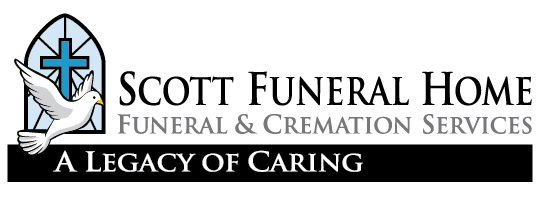What do I do when someone has died?
It’s always a difficult time when someone dies. We’re providing this information so that you can be familiar with what happens next, and what you can do to help the process go as quickly and as smoothly as possible.
First Steps
A declaration of death from the proper authority is the first thing that is required. This can happen in several ways:
- If the person has died in the presence of a doctor, the doctor will issue the declaration.
- If the person dies at home under hospice care, call the hospice nurse. The hospice nurse will issue the declaration of death, and can also help facilitate the transport of the body.
- If the person dies at home without hospice care, call 911. A medical examiner will either issue the declaration of death, or, if the medical examiner does not take jurisdiction, the family will be asked to contact a funeral home.
You can contact Scott Funeral Home and Cremation Services at (253) 572-9555, and we will assist you.
After the declaration
Contact Scott Funeral Home and Cremation Services at (253) 572-9555, and we will set up a time to discuss arrangements and services.
If the person was in the military or belonged to a fraternal or religious group, Scott Funeral Home and Cremation Services will contact the organization. Some groups provide benefits for members who have died, and we will help you navigate through the claims process.
Call the person’s employer, if he or she was working. Request info about benefits and any pay due. Ask whether there was a life-insurance policy through the company.
After funeral arrangements have been made
Obtain certified copies of the official death certificate from House of Scott. You may need more than one certified copy. Some organizations accept photocopies, while others, such as financial institutions, government agencies, and insurance companies require a certified copy.
Locate the decedent’s Last Will and Testament. The will must be provided to the appropriate county or city office to be accepted for probate.
If necessary, the estate’s executor should open a bank account for the deceased’s estate.
People you may need to contact
A trust and estates attorney, to learn how to transfer assets and assist with probate issues.
Police, to have them periodically check the deceased’s house if vacant.
Accountant or tax preparer, to find out whether an estate-tax return or final income-tax return should be filed.
The person’s investment adviser, for information on assets and holdings.
Bank, to find accounts and safe deposit box.
Life insurance agent, to get claim forms.
Social Security (800-772-1213; socialsecurity.gov) and other agencies from which the deceased received benefits, such as Veterans Affairs (800-827-1000; va.gov), to stop payments and ask about applicable survivor benefits.
Agency providing pension services, to stop monthly check and get claim forms.
Utility companies, to change or stop service
Postal service, to stop or forward mail.
Close family and friends, to arrange for care of dependents, pets, and property
A friend or relative, to keep an eye on the person’s home, answer the phone, collect mail, throw food out, and water plants
